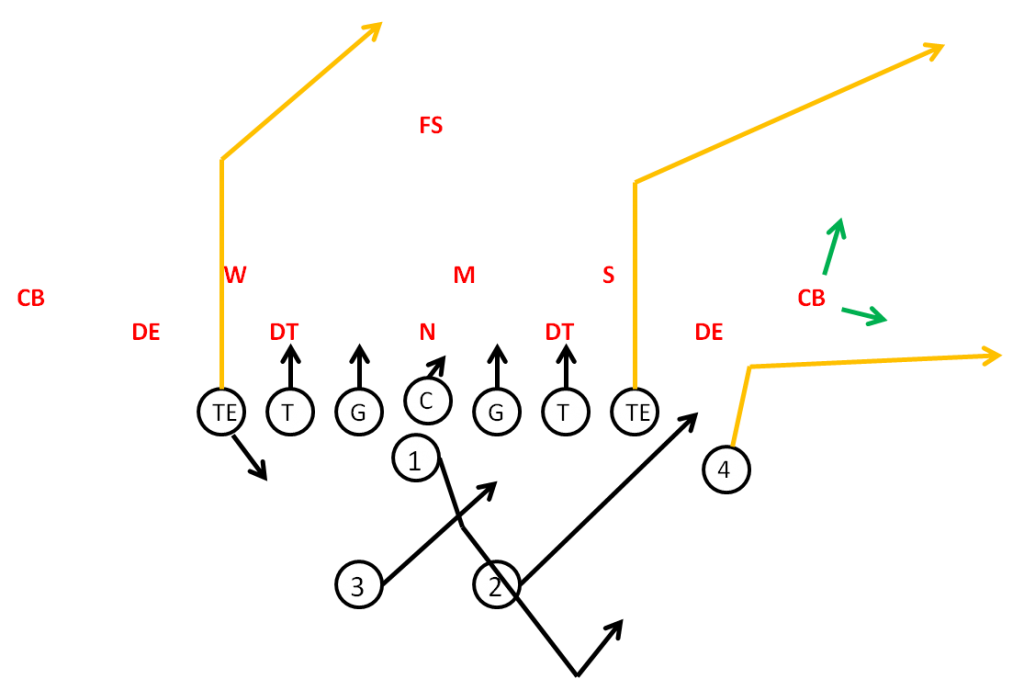This flood passing concept features a corner route by the (TE) and an out route by the (4) off of run-action. Having a player run a deep route (corner) and a player running an underneath route (out) will put the cornerback in conflict. We will execute this play off of play-action which will make the (S) linebacker bite up for run. If the cornerback sits on the low route (the out route), the QB (1) throws the deep corner route. If the cornerback covers the deep corner route, the QB (1) will throw the out-route. The (S) will come flying up when he reads run. The (S) will take himself right out of position when he comes flying up. This play works very well vs man to man coverage. There will be two receivers releasing with one only defender defending. You can have the TE run a backside post as well. This play is very explosive when called on a run down. Ultimately, this play is a watered down version of a high-low passing route concept.
Center (C): Pass block. Against double A-gap defenders always block backside A-gap defender.
Right Guard (G): Pass block-secure inside gap first.
Right Tackle (T): Pass block- secure inside gap first.
Left Guard (G): Pass block- secure inside gap first.
Left Tackle (T): Pass block- secure inside gap first.
Backside Tight-end (TE): Post pattern. It is also an option to have the backside (TE) pass block. If you are concerned about backside pressure have the (TE) stay home and block. If the middle safety is flying out of there or if there isn’t any safety in the middle of the field, this post pattern will be wide open.
Play-side Tight-end (TE): 10 yard corner route. It is vital that the (TE) keeps running his corner route. He must run to the field and away from the defense.
Quarterback (1): Fake handoff to the (3), get depth, look to throw the out route or the corner route. If the cornerback sits on the out route, look to throw the corner route. If the cornerback runs with the (TE) running the corner route look to throw the out route. The backside (TE) is an option when there is no middle safety.
(2): Fake lead blocking – block the defensive end. The (2) must attack this block- meet the DE up at the line of scrimmage, you don’t want that DE 4 yards in the backfield before the (2) blocks him.
(3): Fake taking handoff and block. If you decide to have the backside (TE) release, you can have the (3) secure the backside of the QB.
(4): 5-7 yard out route. If the (DE) is a stud player you can have the (4) chip him before releasing. This will help slow his rush down. The (4) must continue his route out to the field.
Flood Passing Concept Coaching Points
- This is a play-action passing play. The running backs must sell run.
- Call this play on a run down (short down and distances).
- Receivers must run their routes, they cannot stop running. It’s the QB’s job to move his feet and throw the receiver the football.
- QB is reading the play-side cornerback. If the CB sits, the QB throws the corner route. If the CB runs with the corner route, the QB throws the out route.
This Flood Passing Concept works very well in youth football. It is an explosive play and it is very easy to install. This flood concept is out of the split-back formation.
Click for – More Youth Football Plays
